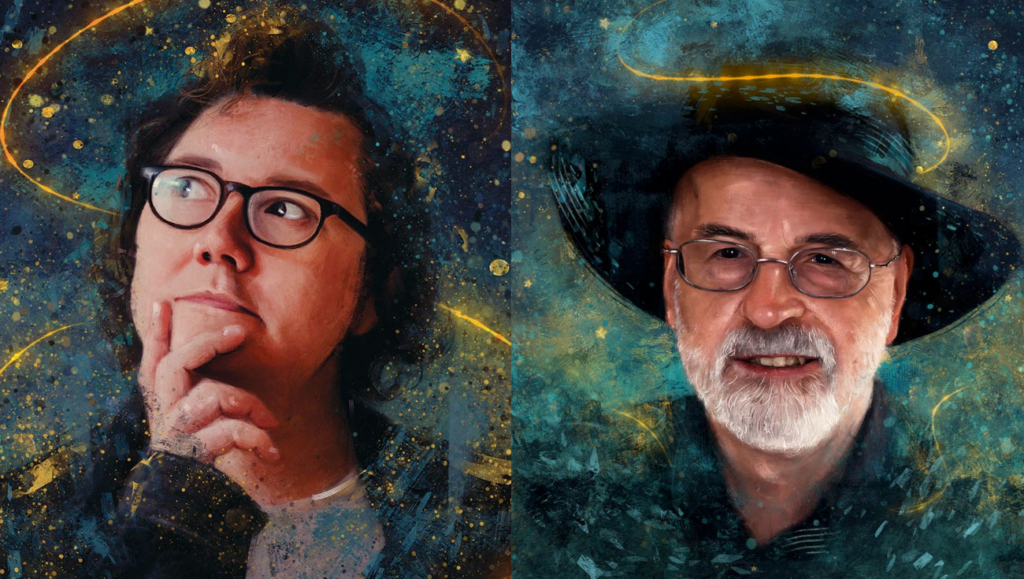
When: October 12th
Where: Bloomsbury Theatre, London
Marc Burrows, the man who wrote The Magic of Terry Pratchett – a book on Pratchett’s life and works that preceded the official biography by Rob Wilkins by some three years – has adapted his book into a comedy show. After a popular run at the Edinburgh fringe, the show is coming to London’s Bloomsbury Theatre on October 12th.
For many Pratchett fans, apart from the time (19.30), the price (£18.50), and where you can get a choc ice and a bananana dakry (find the nearest member of the Ogg clan and ask ’em nicely), that’s as much information as they’ll need to check out the show.
Pratchett inspired, and inspires to this day, a level of devotion in his fans which is mostly heartening, and only sometimes slightly creepy. That’s partly because of –
Well, actually, rather than pontificating like a proper reviewer-type person, how about this: we caught up with Marc before the London show, and asked him exactly that question.
MM: So – what is the magic of Terry Pratchett? What did he have that other comic fantasists don’t?
MB:
I sort of dispute the idea of “comic fantasists” – Discworld is fantasy, and I don’t think Terry would ever have tried to not call it that, and it’s funny, but there’s so much more to it than that. But what made Pratchett different is his humanity, and his deep understanding of humanity, of humans, and of how humans work.
If you ask most people what Discworld is, they’ll say flat planet, elephants, turtle.
If you asked Terry Pratchett what Discworld was, he’d tell you it was a place where things happened to people.
MM:
For the criminally uninitiated, can you give us examples of that idea of his knowledge of humanity?
MB:
Vimes is one – he’s a man who knows he has a darkness inside him, locked within the cage of the rules. In Night Watch, there’s a point where he “feels the Beast rising,” but he knows he can’t go outside the lines, or he’s as bad as the others.
And Rincewind’s another. The Colour of Magic’s by no means Pratchett’s best book, and by the time he’d worked out how to really write Discworld books, he never recommended people start with it, a but in the middle of it all, with its fairly stereotypical fantasy trope characters, are Twoflower and Rincewind – the embodiments of naivety and experienced bafflement, respectively. Rincewind is 35-year-old Terry Pratchett’s experienced bafflement at the world, written down.
MM:
You could argue that these things weren’t new – Clint Eastwood made a career of playing men with a beast in their cage before Vimes ever rose from the page, and Rincewind’s experienced bafflement is basically Arthur Dent in a pointy hat and a beard.
MB:
Oh absolutely. Terry Pratchett didn’t invent the notion of writing good characters, but they resonate with us because other authors too have understood humanity and put them on a page or a screen. The Arthur Dent thing is explicit and intentional – that’s pretty much what he was trying to do with that first book. To do for classic fantasy what The Hitch-Hiker’s Guide To The Galaxy had done for classic sci-fi.
MM:
So what makes Pratchett unique?
MB:
It’s the balance – that understanding of humanity, and the comedy, and the great knowledge of pop culture tropes, and the importance of stories, and the experienced eye of a journalist. Comedy, drama based in observation of humanity, profundity, anger, arcane references, it’s all in there. To get every joke in a Terry Pratchett novel, you probably had to be Terry Pratchett. But that means what you have is a series of books that work for a very wide spectrum of people. Take any of those elements away and the books would be less than they are – that’s probably what most “comic fantasists” don’t have, the humanity and the balance.
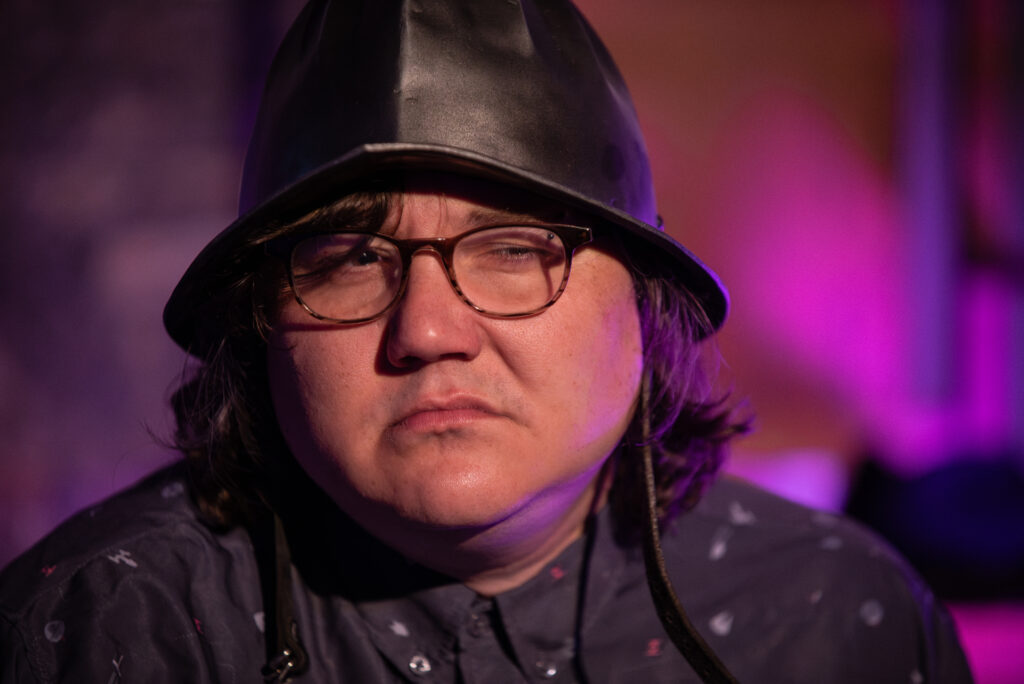
Credit: I Was There Photography.
MM:
And the journey, maybe?
MB:
Absolutely – the sheer speed with which Terry Pratchett got better is phenomenal. The man who wrote The Colour of Magic (Discworld, Book 1) is not the same man who wrote Mort (Discworld, Book 4), and the man who wrote Mort is not the same man who wrote the likes of Night Watch and Monstrous Regiment. There’s a stretch in there where you get peak Pratchett, and he’s just flying.
MM:
The joy of which of course is that where the stretch begins depends on what you’re looking for from a Discworld book.
MB:
Exactly.
MM:
Why write a book, and then a show, about Pratchett’s life, per se? What do you find particularly interesting about the life of the man, as potentially opposed to the life of the writer, or the work he created?
MB:
Well, I wrote the book first, because I pitched a publisher who wanted someone to write a new Tolkien biography. And that went to a real Tolkien expert, but they said “We really like your style, is there anyone else you’d like to write about?”
And I thought “Thank God,” because the one thing the world doesn’t need is another Tolkien biography. So I wrote the book, and this was before the official biography, so I had the space to myself for a bit. And in many ways, it was a typical biography – he was born on this date, he died on this date, here’s what he did in the middle. Including a 20-year stretch which is mainly “Man writes book.”
MM:
So how did you translate that to the show?
MB:
The first version was basically a truncated version of the book. But I read it out to my girlfriend, and honestly, I was boring myself.
It didn’t work, and because it was originally an Edinburgh show, it had a strict 1-hour running time, and that just wasn’t enough.
So I started thinking about the themes of Pratchett’s life and works, and then the jokes within the themes, and that worked a lot better at getting close to the man and the fundamentals of what made him tick.
Now I’m playing theatres, there’s more time and scope, but as an Edinburgh show, it just didn’t work. It was too linear, all the Pratchett fans knew the information and none of the curious onlookers cared. But if you can explain that this was an extraordinary writer, and then go into the themes of his life and work, you can interest lots of people.

Credit: I Was There Photography.
The other thing of course is that he had a really exceptional three-act life-structure, which is narratively pleasing.
MM:
We can feel him grinning from here at that description.
MB:
Ha – yeah. If you think about it though, he was born in the shadow of the Second World War in a poor area in the middle of nowhere, and he becsmr not only a widely-read author but something of a national treasure –
MM:
That’s the publishing version of a very traditional fantasy story – boy from nowhere with a birthmark and a very shiny…erm…pen.
MB:
Ha, yeah – very David Eddings.
But then he had that tremendously strong third act, too. He raised Alzheimer’s awareness and funding, he got a ball moving that’s still rolling today, and then of course he fought for the right to die, which not that many people had thought about till then, and which now is a flourishing movement. He made his death matter. Nobody makes their death matter, but Terry did that.
MM:
There is of course a fairly glorious point to be made there out of the fact that he’d spent a life in writing making his Death matter, so if anyone was going to make their own end matter, it was prrrrrobably going to be Pratchett.
MB:
Right? So yeah, his life had a structure that mattered as much at the end as it did at the beginning or the middle, and it had lots of funny stuff in it, and twenty years of “man writes book,” and wisdom about humanity.
I actually start off the show by saying “This is a story about stories.”
MM:
You know what you’ve done there? If it’s funny, and profound, and a story about stories…
MB:
I know, yeah. I would never claim to have written something as well as Terry Pratchett could have written it, but the point is, he wouldn’t have written it about himself. So I like to think it’s a tribute to him.
MM:
While we have you here, let’s play Desert Island Discworld. Top 5 Discworld books, and why?
MB:
Just Discworld, not Pratchett?
MB: Ha – that was word for word what I said when Mass Movement asked me to do my own Top 5 a little while back. They said only Discworld, so let’s keep it only Discworld.
MB:
Hmm. Have to start with Night Watch – it’s what for me is the beginning of the really superb Pratchett era. Such a clever story – Les Miserables meets Terminator, the story of a man who knows he’s in a timeline that ends with his death but who has to do it anyway. It’s also about the power of stories and how they change or can be changed, like when Vetinari offers to change who Old Stoneface was, because history is very flexible, and Vimes says you can’t do that.
MM:
To which the Patrician says of course you can – history is very accommodating. #FakeNews and all that.
MB:
Exactly.
Monstrous Regiment has to be in there too – he did the horror of war a bit in Jingo, but this is right in there, blood and guts. Also, you see Vimes from the outside and it’s great to have that difference of perspective. And that bit where what initially seem like a bunch of scared young boys is gradually revealed as a bunch of slightly less scared girls. Except for the trans man, who really is a man and wants to stay one.
MM:
Which it’s worth pointing out was written twenty years ago, when trans representation in fantasy was practically nowhere.
MB:
Right? Next up, has to be Feet of Clay – a glorious exploration of whether something’s a person or not.
MM:
Published in 1996, 22 years before the launch of ChatGPT and the boundary issues of intelligence and potential sentience it brought with it.
MB:
Yeah – he was always ahead of the game like that. In 1996, GQ magazine put Terry Pratchett and Bill Gates on a stage together and got them to have a chat. And they probably thought “Two famous people in a room – that’ll be fun.”
But of course what they actually did was to put a technologist on stage with a journalist, and Terry went full journo on him. He questioned Gates on the idea that on the internet, there was no arbitration of the level of fact in any piece of content, so the rise of what was later to be described as “Fake News” was inevitable.
Gates didn’t believe him.
MM:
That aged well…
Side-note – I interviewed an AI technologist just this week, and got it confirmed. The generative AI we see today is entirely dependent for its quality of output on the quality and nature of its input. So if you train an AI on, say, data that supports the Flat Earth theory (or the Moving Turtle Heresy, for that matter), it will confidently return you only answers that fit the pre-determined worldview you want.
We appear to have either learned nothing, or not read enough Pratchett globally, in the course of the last 26 years.
MB:
Ha. And on top of all that, Feet of Clay is a brilliant police procedural – probably the best mystery Pratchett ever wrote, and very twisty and turny.
MM:
*Fumes silently in Men At Arms.*
MB:
Next up, it’s got to be Hogfather.
MM:
*Groans in Scrooge.*
MB:
Hogfather’s one of those Discworld books that squeezes out all the jokes about a subject, like Soul Music and Moving Pictures, but it does it about Christmas and folklore, and the power of belief. Why does Death appear as a character in the Discworld – because it’s what people are told they’ll see.
MM:
Does it work for you as a story?
MB:
Yeah. Why, doesn’t it work for you as a story?
MM:
Nope, I think it wanders off and disappears up its own folklore.
MB:
Well, that’s certainly something some people think about Pratchett books as a whole – they start with a great joke and end with a great idea, and in the middle, go on a wander. I don’t usually agree with that – there are some books that are better than others, by all means.
MM:
*Coughs* Reaper Man…
MB:
Ah, Reaper Man has some lovely bits, and I think it’s Susan’s strongest story, and that bit at the end where Death comes for Miss Flitworth, that’s amazing. But Pratchett later said he wished he’d written it as two books. One contemporary reviewer said of Reaper Man that these were just jokey books, and that the joke was wearing a bit thing now.
But at the heart of Reaper Man is a story about how shopping malls suck the live out of cities – that’s more than a jokey book.
But yeah, Reaper Man’s great – it’s just that its B-plot doesn’t work in the same book as its A plot.
MM:
And finally?
MB:
I have to make a distinction between best and favourite. I think Wyrd Sisters is probably a better Witches book, but I have to go with Witches Abroad because there’s so much that’s perfect in it as a story about stories and a story about people and why they’re not supposed to be the same thing. That line of Granny Weatherwax’s at the end where she said “I had to be the nice one” is perfect in terms of both humans and stories – the opportunities we have that are sometimes taken away by the decisions of others.
Pratchett does a lot of subversion of the form when he really gets going – like Wyrd Sisters is Macbeth if Macbeth was shoved to the side, which allows other characters to thrive, in this case the witches. And he does it in Guards! Guards! too, where he brings in Carrot, who’s from a lowly background with a birthmark and a very shiny…sword, whose destiny is to be king – which is that David Eddings, Raymond Feist, classic fantasy trope we mentioned – and then he shoves him out of the way so that Vimes can rise.
Stories about stories, and stories about people, with all the people feeling like they’re real, rather than existing for the sake of the drama or the story. That’s the magic of Pratchett.
Marc Burrows is at the Bloomsbury Theatre, London on October 12th. Get your bum on a seat and prepare for a magical evening.

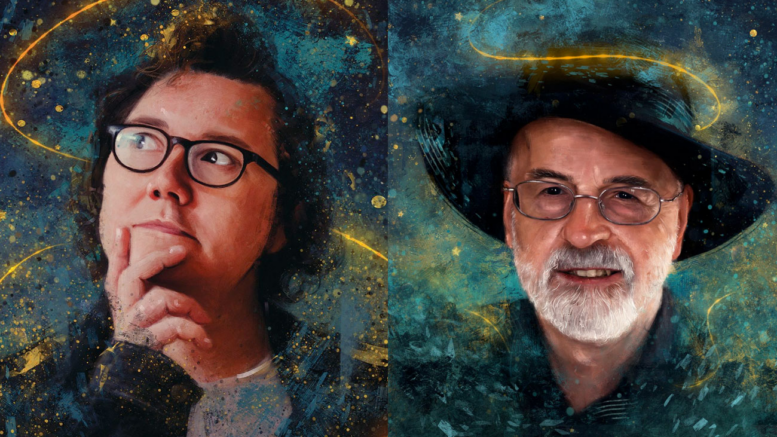
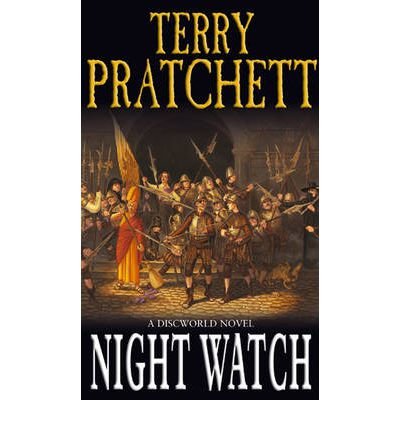
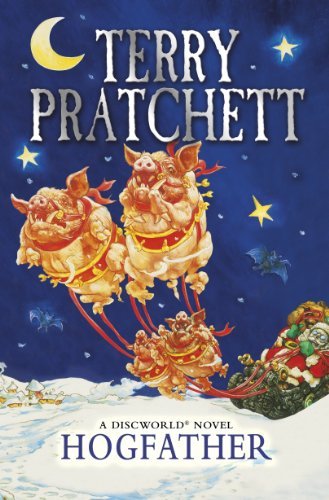
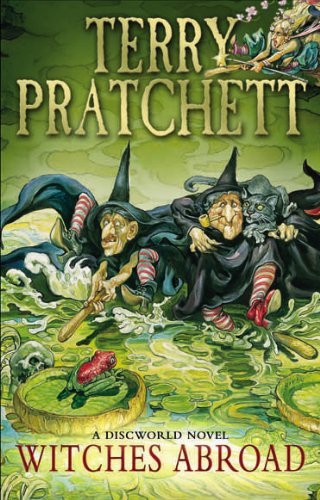

Be the first to comment on "The Magic of Terry Pratchett"